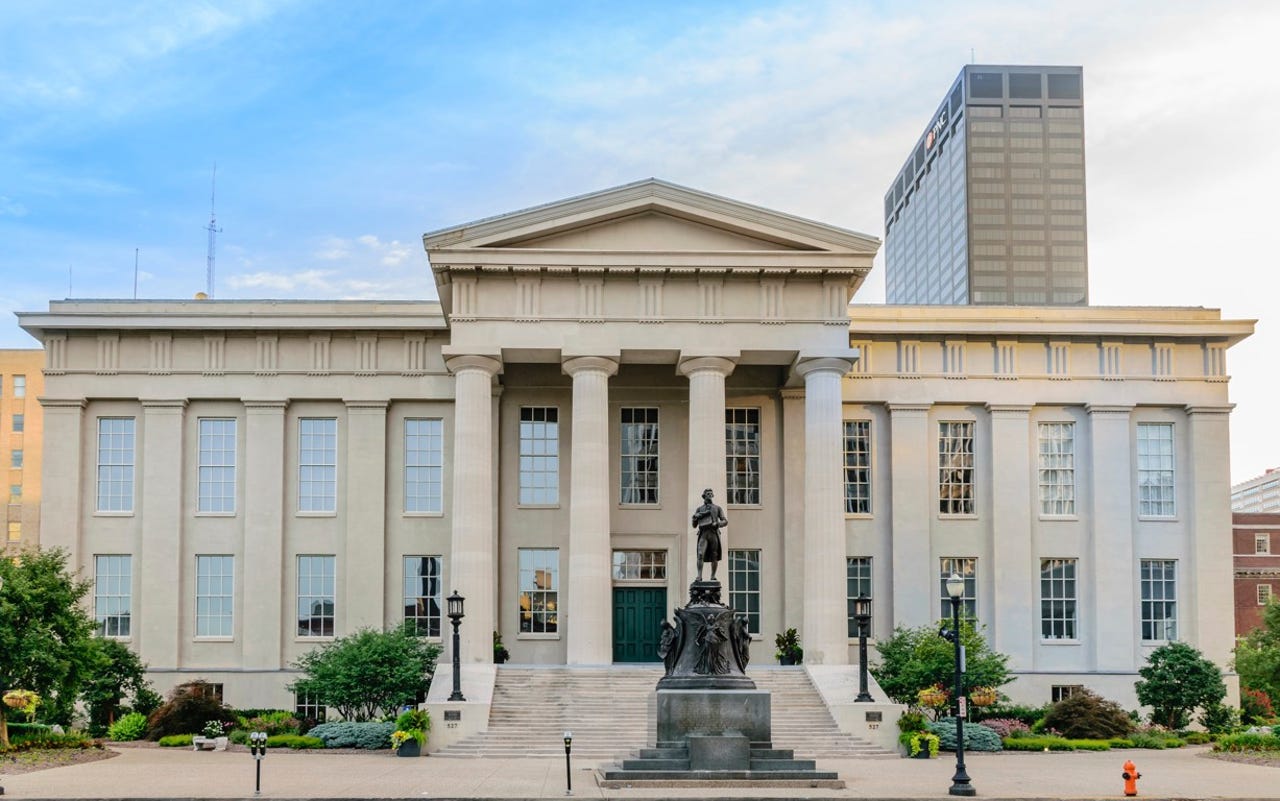Louisville to co-create a smart city with its citizen scientists


Louisville Metro Hall, formerly Jefferson County Courthouse, opened in 1842.
While most smart city initiatives are centered around important pillars such as the Internet of Things (IoT), government data streams, or sustainability plans, Louisville, Kentucky has taken a more grassroots approach by centering around makers.
As a mid-sized US city with a population of over 1.2 million and a legacy that stretches back to the Revolutionary War, Louisville's business reputation has been defined by shipping, health care, and manufacturing. Like nearly every US metro over the past decade, Louisville has been racing to redefine itself for the digital future.
Louisville's digital transformation plans have found the most success in two areas:
- Digital health
- Makerspaces
"We are a city of makers. We have citizen scientists at the grassroots," said Grace Simrall, Chief of Civic Innovation for the City of Louisville.
Simrall pointed out that Louisville's LVL1 and FirstBuild are two of most respected makerspaces in the US. LVL1 is a grassroots community lab and workshop run democratically by its members (Simrall was a founding member). Meanwhile, FirstBuild -- a collaboration between GE Appliances and the University of Louisville -- is a professional hacker space aimed at helping community members bring hardware projects to market.
Both have proved to be fertile ground for entrepreneurs and have successfully run hackathons for years.
While the hacker culture in Louisville has grown up organically, Louisville's emergence as a digital health pioneer has been an outgrowth of being one of the nation's leading hubs for health care companies -- from research hospitals to medical device innovators to insurance companies.
SEE: 3D bioprinter to reproduce human organs, change the face of healthcare: The inside story (TechRepublic)
As a result, Louisville is home to ventures such as XLerateHealth, an award-winning startup accelerator focused on the healthcare industry, and AIR Louisville, a widely-acclaimed program putting smart inhalers in the hands of asthmatics and correlating data from their usage with EPA and sensor data on air quality to explore the connection between asthma severity and air pollution.
Like the city's markerspaces, AIR Louisville is using a grassroots approach to drive innovation and progress. The program views its participants as citizen scientists who are gathering data to be analyzed collectively in order to drive improvements in areas the city can control -- such as greening up trouble spots by planting more trees.
In order to facilitate even more of these kinds of developments, Louisville is launching the LouieLab, a co-working and co-creation space in downtown Louisville that will host the municipality's team working on smart city initiatives while also housing conference rooms and open spaces where community collaborators can come together and work on solving important problems. Louisville is increasingly looking for ways to offer APIs and open data that entrepreneurs and businesses can tap into.
"We've never had a space to bring everybody together," said Louisville Mayor Greg Fischer at the launch event on August 24.
Simrall's team will move into the new space in November.
"The LouieLab is a truly public co-working, co-creation space," she said. "We invite the public at large--whether it's citizens, startups, entrepreneurs, or our corporate partners--to come and co-create with us."
One floor above the LouieLab will be the CNET Urban Smart Home. Based on the original CNET Smart Home launched two years ago, the downtown version takes the same concepts and applies them to apartment living -- where renters often don't have as many options for rewiring or reconstructing the space. CNET uses its living laboratory to test and demonstrate off-the-shelf products that everyday citizens can use to make their living spaces smarter, safer, better connected, and more energy efficient.
With the CNET Urban Smart Home serving as a neighbor to the LouieLab and in partnership with the CIty of Louisville, the next step is seeing how data and feeds from the city can make living spaces even smarter. For example, if traffic on your usual route to work is delayed, could an algorithm automatically color your Philips Hue light bulbs red so that you know to leave a little earlier than usual?
"There's going to be an opportunity for us to have true demonstrations of what the nexus between smart city and smart home will be," said Simrall.
Unlike other cities, Louisville isn't heavily investing taxpayer money in things such as IoT sensors, smart street lights, and other cutting edge technologies. Instead, it's looking for partners -- both corporate and community.
The danger of that is having a bunch of non-integrated projects spinning up in different domains and being incompatible. That's the kind of behavior that Gartner warned about in Internet of Things deployments -- a hot topic at last week's Gartner Symposium 2016 in Florida. Louisville is trying to counter that by only building on open technologies and open architectures.
So far, this approach of "co-creating your government" has allowed Louisville to punch above its weight limit and create the kinds of civic innovations you'd normally expect from bigger, digitally-savvy cities like Boston or San Francisco, said Louisville's former chief innovation officer Ted Smith at the announcement of the LouieLab.
Simrall said, "What we'd like to see is opportunities for us to engineer serendipity and see what magic happens."
Also see
- The world's smartest cities: What IoT and smart governments will mean for you (TechRepublic)
- Smart cities: The smart person's guide (TechRepublic)
- Video: CNET announces results from eight month living laboratory smart home study (CBS News)
- Smart cities: 6 essential technologies (TechRepublic)
- 16 tech jobs that will be needed for the future of smart cities (TechRepublic)